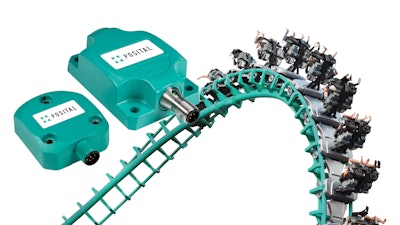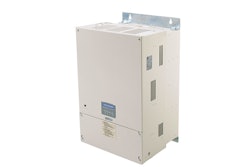
POSITAL has upgraded its Dynamic TILTIX inclinometers (tilt sensors) with enhanced signal processing algorithms, significantly improving their ability to provide accurate tilt measurements under challenging dynamic conditions. While the previous generation of dynamic inclinometers has been successfully used in many applications, the new algorithms offer more reliable performance in complex multi-axis dynamic environments. Applications that will benefit from these advancements include construction and mining machinery, industrial robots, and materials handling systems like forklifts and cranes. They are also suitable for safety systems, such as roll-over avoidance systems in off-road machinery and self-driving vehicles.
POSITAL’s Dynamic TILTIX inclinometers are designed for reliable spatial orientation (tilt) measurements in machinery experiencing rapid motion, shock, and vibration. Their exceptional performance stems from a dual-sensor measurement system that combines micro-electro-mechanical system (MEMS) accelerometers with gyroscopic sensors. This system addresses a key limitation of traditional ‘static’ inclinometers which rely solely on accelerometers. In these systems, inertial forces experienced during sudden motions can cause measurement errors. By integrating acceleration data with rate-of-rotation measurements from the gyroscopes, the sophisticated signal processing algorithms in Dynamic TILTIX inclinometers accurately correct these errors.
In addition to providing reliable tilt measurements, these instruments can also report accelerations and rates of rotation in three axes. This supports additional functions, such as monitoring complex motion sequences on container bridges or spreaders.
Dynamic TILTIX inclinometers are available with several measurement ranges, including single-axis (up to 360°), dual-axis (±90°), or a combination of 180° around the X-axis (pitch) and ±85° around the Y-axis (roll). They provide an accuracy of ±0.3° and a resolution of 0.01°. The new generation inclinometers are programmable, allowing users to customize output characteristics to suit their specific operational needs. CANopen and SAE J1939 interfaces are supported.
These inclinometers come in heavy-duty die-cast metal housings or in compact, cost-effective packaging made of fiber-reinforced plastic. Both options are available with highly effective environmental protection (up to IP69k) that shields internal components from dust, prolonged immersion and high-pressure water jets. Operating temperatures range from -40°C to +75°C.
For more information, visit posital.com.






















